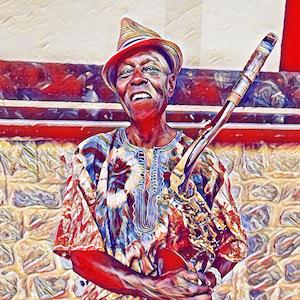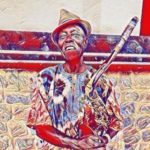

James “Plunky” Branch is a jazz saxophonist, songwriter, and music and film producer.
Born in Richmond and educated in the city’s segregated schools, Branch attended Columbia University in New York City. With a sound deeply rooted in spiritual and vanguard jazz, poetry and percussion instruments, Plunky’s band Juju signed to the artist-centered Strata East label and issued “Message from Mozambique” in 1973, winning acclaim from their peers as well as from some critics. They followed with “Chapter Two: Nia” in 1974. Though still abstract, the set reflected the influences of Fela Kuti’s emerging Afrobeat, the spidery funk of James Brown, modal improvisation, and more. The group had aligned itself with Coleman and Sun Ra, and often shared stages with them.
By the mid ’70s, the band had changed its name to Oneness of Juju, and had crystallized its populist meld of jazz-funk, spiritual soul, and R&B. Since it was difficult to find club gigs for a band of that size, they often played concerts at political rallies where their message of empowerment and self-realization registered. They released their penultimate LP “African Rhythms” in 1975. Given the label’s limited reach, the set didn’t chart but did garner critical acclaim. That said, its tracks were played often on radio and the title track became the theme song for Howard University’s news show “The Daily Drum.” They signed with the Black-owned booking agency Charisma Productions and opened shows for Roy Ayers, Chuck Brown, Lonnie Liston Smith, Norman Connors, and Gil Scott-Heron. In 1982, their song “Every Way But Loose” made the top 10 on the London soul music charts. Over the next decades, producers, beatmakers, DJs, and crate diggers would sample Oneness of Juju’s music, with the original LPs becoming hard-to-find collectors items.
Branch and his group have continued recording and performing, most recently as Plunky & Oneness. Beyond the band, his accomplishments are remarkable: he was a founder of the Richmond Jazz Society in 1978; he has released more than 20 albums through his independent record label; he worked as a studio musician, including for the hit sitcom The Cosby Show, composed hundreds of songs, and produced a documentary, Under the Radar—A Survey of Afro-Cuban Music. Working with the U.S. Information Agency and the Virginia Commission for the Arts, Branch has educated audiences at home and around the world about the cultural significance of music. He has lectured on African-American music at Virginia Commonwealth University and directed the Virginia Union University Jazz Ensemble; and in 2012 he was named one of the Richmond Public School system’s Living Legacies. (bio courtesy Allmusic.com)
Leave a Reply
You must be logged in to post a comment.